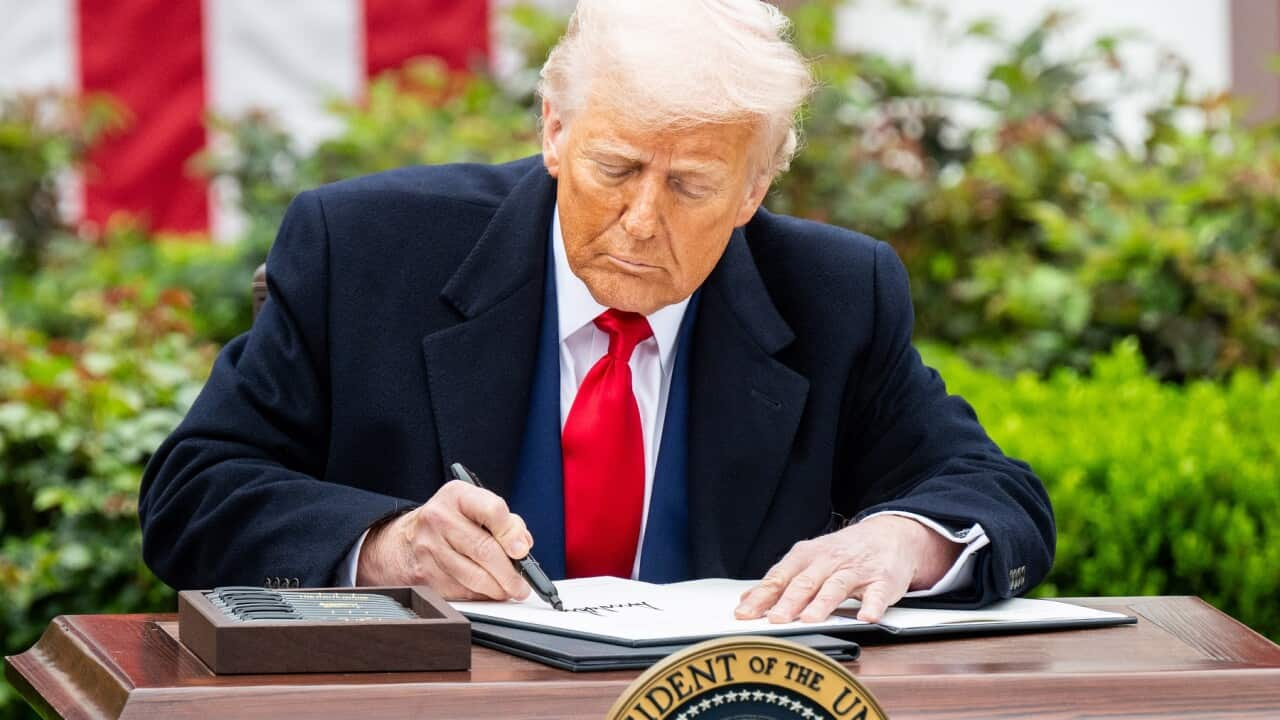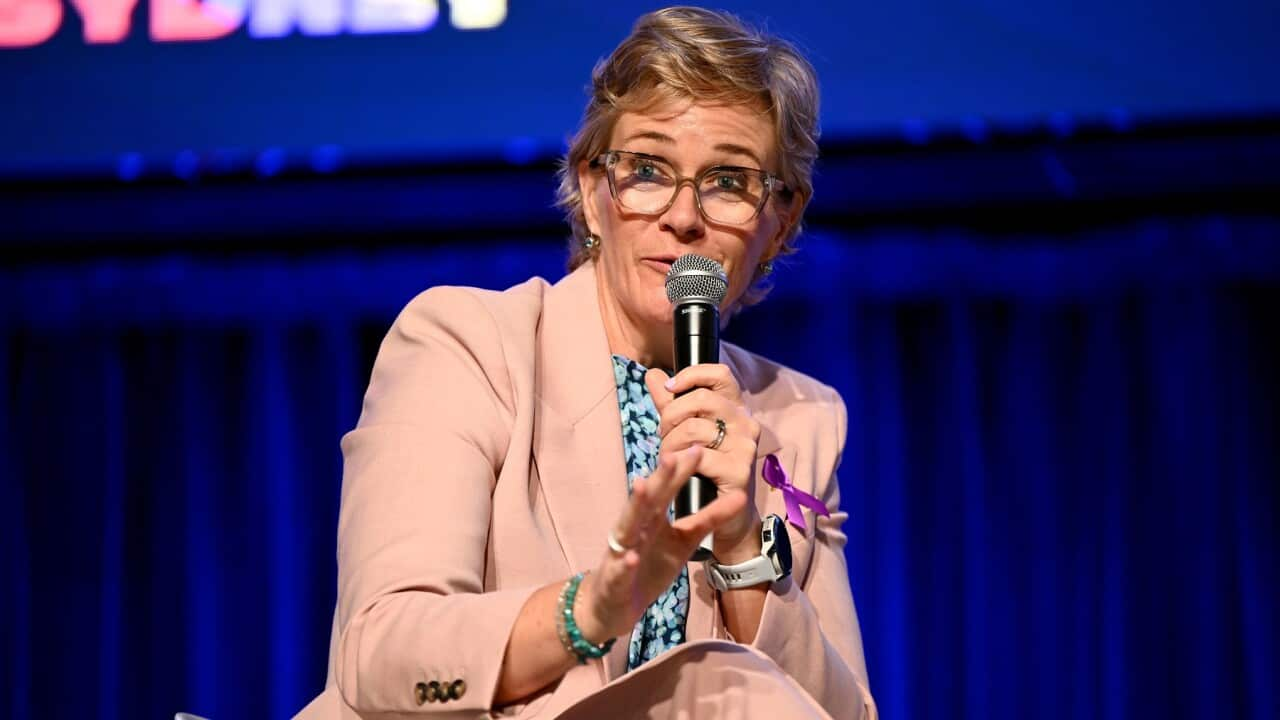TRANSCRIPT
US President Donald Trump has called it the 'most beautiful word in the dictionary', and today he's shown just how serious he was.
That word, of course, is tariffs.
In a sweeping announcement made today, U-S President Donald Trump signed an order imposing a baseline 10 per cent tariff on all goods imported to the U-S, with some countries hit with higher duties.
From close allies to long-standing rivals, no country was spared.
“For decades our country has been looted, pillaged raped and plundered by nations near and far, by friend and foe alike. American steelworkers, autoworkers, farmers and skilled craftsmen, we have a lot of them here today, they really suffered gravely, they watched in anguish as foreign leaders have stolen our jobs, foreign cheaters have ransacked our factories, and foreign countries have torn apart our once beautiful American dream.”
Speaking at the White House Rose Garden, Mr Trump says that for years, large and persistent US goods trade deficits have been 'hollowing out' the domestic manufacturing base.
Alongside a 10 per cent baseline tariff, he also announced an additional punitive import tax - tailored for each of about 60 countries.
With new barriers placed on the world's largest consumer economy, Donald Trump says the measures will return wealth to Americans.
Addressing his concerns about auto workers and car manufacturing, he also announced a separate 25 per cent global tariff on car imports.
“But such horrendous imbalances have devastated our industrial base and put our national security at risk. I don't blame these other countries at all for this calamity. I blame former presidents and past leaders who weren't doing their job. They let it happen and they let it happen to an extent that nobody can even believe. That's why effective at midnight, we will impose a 25% tariff on all foreign made automobiles.”
Disrupting a decades old trade order, the new barriers undo arrangements that have been in place since 1947.
But Donald Trump says that for too long, the rest of the world has been taking advantage of the United States.
With global trading partners expected to respond with countermeasures, Mr Trump says there will be no exemptions without something offered in return.
“Likewise to all of the foreign presidents, prime ministers, kings, queens, ambassadors and everyone else who will soon be calling to ask for exemptions from these tariffs, I say, terminate your own tariffs, drop your barriers. Don't manipulate your currencies. They manipulate their currencies like nobody can even believe which is a bad, bad thing, and very devastating for us.”
Thomas Bridges is an assistant professor of economics at the University of Delaware.
He says if the announcements lead to higher tariffs long term, it could have significant impacts on the global economy.
“The foundation of a strong economy is one in which people can specialize in what they do best. And the same holds for a global economy, like the foundation for a strong global economy is when nations can specialize in the production of goods or services that they can do best. And having no barriers to trade, you know, makes the economy more efficient and provides sort of a solid foundation. So, my concern would be that if these tariffs are long lasting, it could have quite significant effects on, you know, the foundations of global economies.”
Professor Bridges is not alone in his concerns about the long term effects.
So, what exactly are tariffs and why is Donald Trump imposing them?
Tariffs are a form of tax, imposed on goods coming into a country by the nation receiving them.
The company importing goods to the United States is generally the one who will pay extra, they then can decide whether to absorb that cost themselves or pass it onto the consumer.
While tariffs often lead to higher prices for consumers, Donald Trump says the measures are about encouraging American industry and boosting the US economy.
In Texas, Houston Wine Shop manager Antonio Gianola says Americans don't realise how much this will affect them.
“I don't think we realize how much these things really affect us domestically. it's not, I would say it's just not it's not something that somebody else pays. That's something that America pays. And American businesses and American employees are the people that end up suffering.”
Canada and Mexico, the two largest trading partners of the US, will not face additional tariffs on top the 25 per cent tariffs announced earlier this year.
Australia is among a select few countries hit only with the baseline 10 per cent tariff, alongside the UK, New Zealand, Singapore and others.
Mr Trump did however express some concerns about Australian beef.
“Australia bans, and they're wonderful people and wonderful everything, but they ban American beef. Yet, we imported three billion dollars of Australian beef from them just last year alone. They won't take any of our beef. They don't want it because they don't want it to affect their farmers, and you know what? I don't blame them, but we're doing the same thing right now starting out midnight tonight.”
The ban on US beef was imposed in 2003 after the United States saw an outbreak of bovine spongiform encephalopathy, also known as mad cow disease.
Prime Minister Anthony Albanese says he will stand strong in the face of US tariffs, but says Australia won't impose retaliatory tariffs.
When responding to the news, Mr Albanese says it's important to remember that Australian exports to the US represent under 5 per cent of goods exports.
“President Trump referred to reciprocal tariffs. A reciprocal tariff would be zero, not 10 per cent. The administration's tariffs have no basis in logic and they go against the basis of our two nation's partnership.”
As trading partners around the world respond to the announcement, some Americans are also responding with alarm.
In Washington, communications worker Sophia says she has concerns about the auto import tariffs.
“I was just talking to my roommate about how I'm so thankful I don't have a car or need a car in a city like D.C. because I can't imagine - I know it's like 25% on auto imports now so - yeah that's huge for anyone who is looking to purchase a car this year. Thankfully I get to rely on public transport and walking but yeah it's going to be a lot.”
Donald Trump has promised Americans that as a result of his economic and trade policies, American consumers will pay less for things like groceries.
Democratic senator Chuck Schumer says the opposite will happen.
“It is estimated that the average American family will pay more than $5,000 out of their pocket to pay for these tariffs, that these tariffs will cost them $5,000 as the prices of everything goes up, whether it's groceries or cars or wood or you name it, across the board. Why would Trump do this? Why would Trump do this? One reason he wants to take the money that he gains from tariffs to give tax cuts to billionaires.”













